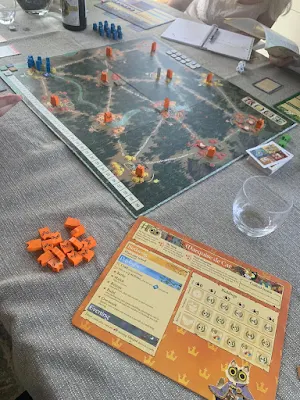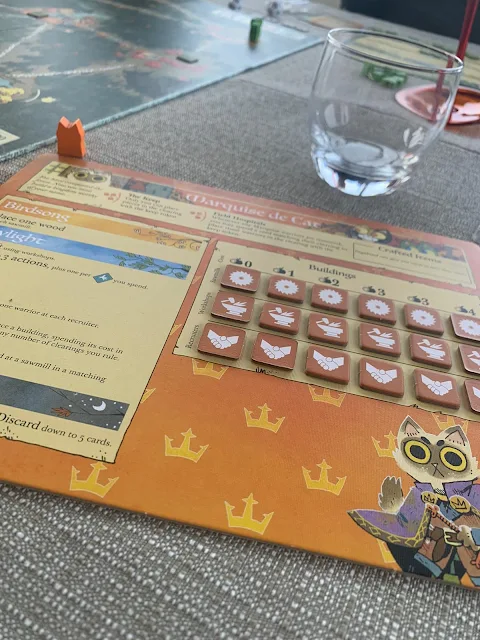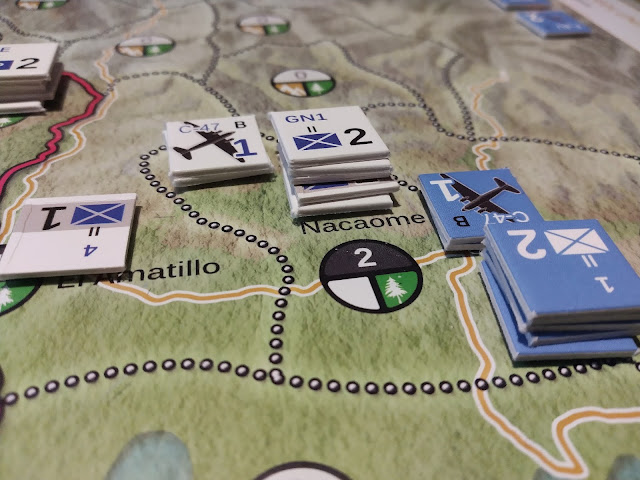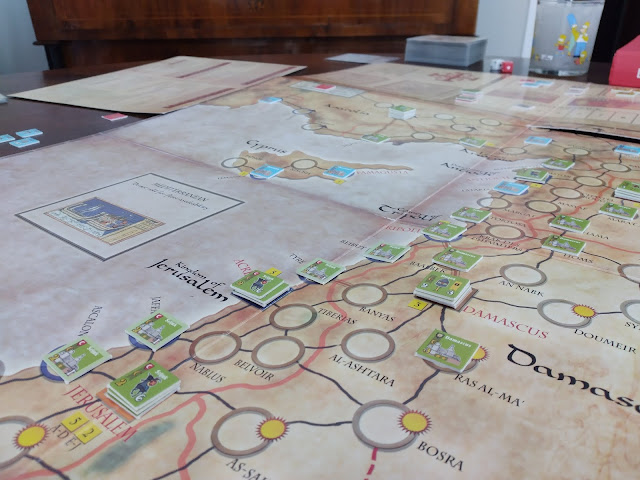Root. The voice of the master
The liberation of the wood of Root. A bedtime story for young and old.
It was April 25th in the woods of Root. Like so many things that proliferate in the spring, the capitalist machine of the Marquise de Cat had also expanded throughout the territory, after having wrested power from the ancient aristocracy of birds that ruled the forest for centuries.
But while the cats were preparing the gentrification of the forest, watchful eyes gazed upon them. A multitude of quick and sparkling looks, with equally brilliant ideals, wondered when the time would finally come for the people to rise up.
At the same time, very different eyes, rapaciious and warring, contemptuous of the worldly openness to trade that characterized these conquering bourgeois, meditated in the shadows, eager to restore the ancient splendor and promulgate the edicts with which, in a not so distant time, they terrified the forest.
Finally, a single pair of deep, ringed eyes, the disillusioned eyes of one who had already received a promise of suffering at birth, observed these turmoil in an apparently detached way.
This last pair of eyes belonged, as the devoted reader will have already understood, to a raccoon. And raccoons are curious beings, wanderers and a bit of thieves. This raccoon was all three of these things together. And it is for this reason that, casually finding himself in a clearing in which an abandoned ruin stood, he began to explore it. He didn't get much out of it, just a few jute sacks useful for mending his torn overcoat, which he grabbed just before plunging back into the forest.
As real life teaches, as well as fairytale fiction, the powerful always find ways to profit from the actions of the beggars. So it was, even in this case. A few days later, in fact, the soldiers of the Marquise de Gattis arrived in the aforementioned clearing, and, realizing that the spot explored by the raccoon was now free of debris and rubble, updated the building index. In place of the ruin, a sawmill was immediately built, where the foxes that lived in the rador were put to work.
Eventually several sawmills appeared in different parts of the forest. And in addition to these factories and recruitment centers arose: in fact, every day new natives joined the cause of cats. Some did it to give their families a better future, others because they were fueled by hatred of previous rulers, others because they thought it was a bargain. However, no one did it because of ideal higher than mere earthly existence.
In fact, the sense of honor of the winged dynasty flew much higher than that of cats. These birds were noble, devoted to the arts of chivalry since being chicks, matured in contempt for any race that was not their own. Their formality, coupled with the obsessive attention to rules and public offices, had been at the same time the reason for their ancient rise and their most recent fall. Commander Eagle, the charismatic leader in office at the time, had managed, with his rousing public speeches, to recruit enough bird-soldiers to begin the reconquest of the forest and claim the birthright of his own people: the command of the Kingdom. He was ready.
While the first battle was taking place in the east and the felines perished under the claws of the winged lineage, in the center of the wood, in its most remote and beating heart, right around that unhappy clearing populated by foxes reduced to forced labor in the Marquise's sawmill , a great ferment shook the branches of the trees. The plebs had witnessed the counter-offensive and were struck by it. One clearing at a time, in fact, the birds were returning to the fore and so that village too, in one day, was eventually freed. However, with the birds the yoke of the old aristocracy also returned. And it was then that the plebs began to think of an alternative way to manage the "res publica".
Suddenly the revolt broke out. The large contingent of avian troops was completely exterminated. In addition, the first underground rebel base was born in this outpost. From here, sympathy for the ideals of self-management spread to the rest of the forest. Gradually these bases became more and more organized and the objectives of ecology, freedom, power of the people became more and more defined in the hearts of the dissidents. The Revolutionary Forest Militancy was therefore officially born; a few days later it could count on the establishment of a second base, this time set up in a nearby village of mice, in turn oppressed by the Marquise.
While not understanding the hostilities of the people of woods against progress that everyone would benefit from, the latter knew she had to act quickly. In addition to the problems caused by the Militancy, birds were also gaining ground. They had won two battles in the northeast and were building new nests. It had become necessary to institute a forced recruitment plan.
The raccoon observed all of this from afar. Occasionally he passed by the outpost ruled by the Militancy. The companions of the covenant offered him a hot meal and a bed. At the dinner table, in the evening, they talked to him about the importance of preserving the forest from the pollution of the sawmills, about a family that had lost the house they had built on a tree, about the buildings that were about to be built. However, he never pronounced himself on the matter. Some also thought that, in reality, he was on the side of the masters. From his face, however, nothing showed. It seemed he was elsewhere, lost in indecipherable thoughts.
He was a taciturn and shy type. Some described him as a skilled craftsman, others as a shrewd thief. Nobody knew his name or his history. One night the puppies of the Militancy, intrigued by that strange figure, rummaged in his bag while he slept. Inside there were only a few coins and a rudimentary hammer. It looked like he built it himself. And indeed it had been, because that vagabond had also come here to trade with local citizens, but these warring peoples had shown little interest in crafts. So he had to build things for himself.
As the cats continued to recruit new troops, the creatures of the wood to organize protest sit-ins and the raccoon to conceal his intentions, Commander Eagle's government collapsed. Dishonor fell upon him, for he had promised to wage an uninterrupted war and instead his momentum had slowed down for an instant, mostly because all the enemies in range had been defeated. Despite his charisma, he was unable to save his feathers before the Vysir Council. He was deposed with immediate effect and sent into exile. The council set up a new government and this time it chose an army bird with great experience in battle: Commander Owl.
The new troops of the cat-soldiers were sent to suppress the rioters of the Revolutionary Forest Militancy, a sortie that proved unsuccessful. After bribing the guards at the clearing entrance - the woods' alliance had instituted new rules for that outpost, one of which involved paying a toll for all troopers not members of the Revolutionary Party - the cats confronted the numerous rebel forces in a battle that turned out to be total carnage for them. Not one of the cats was saved; among the rebels not one fell. Apparently their entry into the clearing had not gone unnoticed and the Revolutionary Wooded Militancy had prepared an ambush.
Another feline contingent was caught in a second ambush, this time by birds. It was a bloody battle on both sides, but Commander Owl proved himself worthy of his rank. To finish off the mood of the surviving soldier cats, the raccoon, who had remained neutral until then, looted the feline camps and stole most of their weapons. Some said that this was the fundamental proof that he had always been on the side of the people. Others said he was on the side of the bird dynasty. The most extravagant version exalted the genius of the wanderer, theorising that he had procured the cats the raw materials to make weapons to use in battle and had then stalked the army division equipped with these weapons, waiting in the shadows for the right moment to steal them. What we know for sure is that, following this theft, he went into the thick of the woods and nothing more was heard of him.
If this was a fairy tale, the different peoples would have found a way to put an end to this war. The Militancy would have had an equal say in the decisions of the cats. An agreement would have been found between the advancement of progress and the conservation of green areas and their biodiversity. The dynasty of birds would have become more flexible and would have learned to accept sharing power, realizing that those who are different are not necessarily also an enemy.
Since we are talking about animals, however, we cannot expect from them the wise reasoning that distinguishes the human race.
Despite the serious sabotages inflicted on it, it became impossible, in fact, to stop the capitalist machine of the Marquise de Cat, who, exploiting corruption and replying with systematic repression at the slightest hint of rebellion, was able to assert her control on the rabbit-controlled clearings. Thus the Revolutionary Forest Militancy lost credibility, and the implausibility of the aspirations of the noble birds was also demonstrated. Once the noble people of rabbits were subdued, even the rats and foxes were forced to bow their heads before the power of the Marquise.
The forest then became a huge industrial complex. Factories were built in the clearings, offering poorly paid work to local citizens, now unable to reorganize themselves into a union capable of protecting workers' rights, since the Militancy had been dissolved. With industrialization then came alienation and shopping malls.
But that's another story.
Do you want to read other stories? Click here for the full list.











Comments
Post a Comment